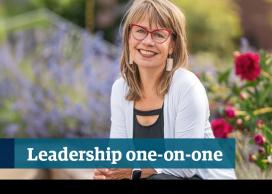Dr. Ananya Mukherjee Reed is Provost and Vice-President, Academic, at UBC Okanagan and Professor in the Department of Economics, Philosophy and Political Science at the Irving K. Barber School of Arts and Sciences.
An interdisciplinary scholar in the field of Development Studies, Dr. Mukherjee Reed’s work over the past decade has mostly concentrated on inclusive and people-centered development. Her current research project, in collaboration with the United Nations Research Institute for Social Development (UNRISD), Geneva, focuses on the UN’s Sustainable Development Goals and the role of universities in social change.
Prior to joining UBC in November 2018, Dr. Mukherjee Reed was Dean of the Faculty of Liberal Arts and Professional Studies at York University. During her time at York University, she also served as Associate Vice-President of Research, Chair of the Department of Political Science, and Founding Director of the International Secretariat for Human Development. In 2016, she was named as one of five brilliant women in academia by Canadian Immigrant magazine in their third annual tribute to ‘Immigrant Women of Inspiration’.
Q1. What quality do you most admire in a leader?
AMR: Boldness of vision and an ability to create a sense of possibility. This is particularly important when hope is elusive, and despair seems to get the upper hand. A leader should be able to create a sense of possibility, whatever the perceived constraints are.
Q2. What makes you laugh?
AMR: Very sharp, spontaneous wit.
Q3. Who inspires you, and why?
AMR: I am inspired by everyday people and their struggles. That is where you see how indomitable the human spirit is. I see this especially in our Indigenous youth, and in all of the ways they are providing leadership for the reconciliation that Canada needs. I admire how their vision and efforts are helping us forge a new future.
Q4. For you, what makes UBC different?
AMR: I have watched UBC from afar for many years, and was delighted to take on the role of Provost at UBC Okanagan. There are not many universities which can boast 100 years of eminence as well as a 15-year-old campus with such a strong trajectory of achievement. Its wide range of partnerships begin with Indigenous nations and community partners in Vancouver and the Okanagan and extend to so many different parts of the globe. This sets the context for UBC to co-create knowledge and have a tangible impact in so many fields. In the Okanagan, I have seen how much a research university is cherished by the community. If we are successful in mobilizing that support, it will make UBC even more distinctive.
Q5. What is the most important lesson you’ve learned, in your career to date?
AMR: That one cannot afford to give up. As a university, we are a critically important partner to society in its search for answers to big challenges. We must continue to enrich that partnership.
Q6. How do you like to recharge?
AMR: Good conversations. Especially when my spirits are low, one good conversation is all I need. I am also recharged by simple things — such as a moment to savour the brilliance of the sun or the vastness of the sky. And yes — music and poetry — they are integral to my life.
Q7. What is the best advice you were ever given?
AMR: The best advice I have ever been given is that one can achieve many things, but they do not necessarily bring a sense of fulfilment. Fulfilment is found in pursuing things that are greater than oneself. This is a theme that has been present in my life since childhood, through my parents, grandparents, my teachers and my husband.
Q8. What do you value in your colleagues?
AMR: Their commitment to students and to the mission of the university. I also value a sense of humour. There will always be challenges but one must laugh!
Q9. What do you hope will be your lasting impact at UBC?
AMR: In my work as a critical social scientist, I am motivated by the question of justice. When I reflect on the university through that lens, I ask: “How can justice be instilled in the core of all the activities of a university?” Sometimes an argument is made that universities should pursue ‘excellence’ and ‘excellence’ alone. But when I look at UBC, I see a public institution that is extremely well-positioned to pursue both excellence and justice and demonstrate to the world how these two qualities enhance one another. I would love to contribute in any way I can to advance UBC in its quest for excellence and justice. Of course, there is no single definition or interpretation of the term ‘justice’. Universities can play an important role in creating inclusive conversations about the very meaning of justice. I would be honoured to participate in such a process at UBC.
Q10. If you could have a super power, what would it be?
AMR: To completely take away the destructive power in human beings.
Q11. What are your priorities for the Office of the Provost and Vice-President, Academic, at UBC Okanagan?
AMR: An overarching priority is to consolidate the institutional connections between UBC’s two campuses, and harness every possible synergy we can. Only then can we fulfil our public mandate, especially in key areas such as the response to the TRC Calls for Action. UBC Okanagan has been very successful in attracting talent. Now we need the resources to harness that talent, to foster the kind of inclusion we are so deeply committed to, and to offer students an academic experience that is second-to-none. The Okanagan campus is brimming with brilliant ideas. My top priority is to find the resources to bring these ideas to fruition. This is what keeps me awake at night.
Q12. UBC Okanagan is currently in the midst of a planning exercise to map out future needs, and opportunities, for this campus. What role do you see UBC Okanagan playing within higher education, in the next 10 to 20 years?
AMR: This is a very exciting time for UBC Okanagan — I feel so honoured to be here. Our Outlook 2040 was recently endorsed enthusiastically by the Board of Governors, following a similar endorsement by the Okanagan Senate.
This process has reinforced the collective commitment of the campus to work closely with and in support of Indigenous peoples and communities to address the legacy of colonialism. This is key to the future of higher education. ‘Outlook 2040’ also imagines UBC Okanagan as a place where new relationships between disciplines emerge. We are imagining the humanities, the social sciences, the creative fields, the sciences and the professional fields to come together to co-create new thinking on key questions of social importance.
The Outlook also envisions the university as an institution that never closes its doors to anyone who wants to learn — at any stage of one’s life. This is critical at a time when knowledge is evolving so rapidly. Universities must ensure that people are served by the advances in knowledge and not excluded or displaced by them. This means not only that we must rethink our pedagogy, our degree structures, our research practices (etc.), but also engage the public in this process of rethinking.
‘Outlook 2040’ expresses the bold aspirations of a young campus of a globally influential university, entering its next century. If we are successful, the impact on higher education will be significant.
These are big dreams, indeed… but you can’t dream small, can you?
Published: June 1, 2019
Interviewed by: Kate Hunter, UBC Internal Communications



